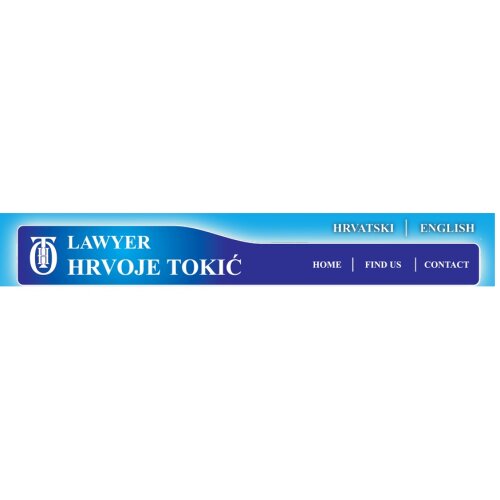Best Energy Regulatory Law Lawyers in Croatia
Share your needs with us, get contacted by law firms.
Free. Takes 2 min.
Or refine your search by selecting a city:
List of the best lawyers in Croatia
About Energy Regulatory Law in Croatia
Energy Regulatory Law in Croatia sets the framework for the production, transmission, distribution, and supply of energy resources including electricity, natural gas, oil, renewable energy, and other fuels. The legal framework is influenced by Croatia’s membership in the European Union, which requires harmonization with EU energy directives and regulations. The main objectives of Energy Regulatory Law are to ensure a reliable, safe, and sustainable energy supply, to facilitate competition, to protect consumers, and to support the transition to renewable energy sources. The Croatian Energy Regulatory Agency (HERA) oversees and enforces these laws, issues licenses, and regulates tariffs.
Why You May Need a Lawyer
There are many scenarios where a lawyer specialized in Energy Regulatory Law may be essential. Common situations include:
- Navigating the permitting and licensing process for energy production or supply projects
- Dealing with compliance requirements for renewable energy installations
- Negotiating energy supply and purchase agreements
- Addressing disputes involving access to the energy grid or tariffs
- Assisting with regulatory investigations or enforcement actions
- Acquiring or divesting energy assets or investments
- Pursuing state incentives and subsidies for green energy
Local Laws Overview
The Croatian energy sector is primarily regulated by:
- The Energy Act (Zakon o energiji)
- The Electricity Market Act
- The Gas Market Act
- The Renewable Energy Sources and High-Efficiency Cogeneration Act
- Various regulations and decrees issued by HERA and the Ministry of Economy and Sustainable Development
Frequently Asked Questions
Who regulates the energy sector in Croatia?
The Croatian Energy Regulatory Agency (HERA) is the main independent regulatory authority overseeing energy markets, licensing, tariffs, and consumer protection in the energy sector.
Do I need a license to generate renewable energy for my own use?
Generally, small-scale self-consumption of renewable energy (such as rooftop solar panels for personal use) is allowed with a registration process, but commercial generation and supply typically require a license from HERA.
How are energy prices set in Croatia?
Energy prices for households and small businesses are typically regulated by HERA, while large consumers may negotiate prices in the free market. Network tariffs are also regulated.
What incentives are available for renewable energy projects?
Croatia offers various incentives such as feed-in tariffs, premium tariffs, investment grants, and tax incentives for eligible renewable energy projects. The specifics depend on the type and scale of the installation.
How do I connect a renewable energy project to the national grid?
Project developers must follow a detailed procedure that includes applying for connection to the grid operator, undergoing technical assessments, securing permits, and signing connection agreements. Legal assistance can help streamline this process.
What happens if I do not comply with energy regulations?
Non-compliance may result in administrative fines, suspension or revocation of licenses, and possible civil or criminal liability, depending on the severity of the breach.
Are foreign investors allowed to own energy assets in Croatia?
Yes, foreign investors can acquire and operate energy assets in Croatia, subject to national security screening for critical infrastructure and compliance with licensing and regulatory requirements.
Can I sell surplus electricity generated from my solar panels to the grid?
Yes, there are legal mechanisms for individuals and companies to sell surplus electricity to the grid, typically under the status of a “prosumer.” Registration, metering, and contractual arrangements are required.
How are disputes in the energy sector resolved?
Most disputes are initially addressed through negotiation or mediation. If unresolved, they may be brought before HERA, the competent courts, or arbitration panels, depending on the nature of the dispute.
What is the role of HERA in licensing?
HERA evaluates applications and issues licenses for energy production, transmission, distribution, and supply, ensuring that licensing criteria and ongoing compliance are met.
Additional Resources
Several organisations and governmental bodies can provide guidance and support for energy regulatory matters:
- Croatian Energy Regulatory Agency (HERA): Oversees licensing, market regulation, and consumer protection
- Ministry of Economy and Sustainable Development: Responsible for energy policy and legislation
- Energy Market Operator (HROTE): Manages the electricity and gas markets, as well as renewable energy support schemes
- Croatian Transmission System Operator (HOPS): Manages the national electricity grid
- Local chambers of commerce and industry associations: Offer information and legal support for businesses
- EU Commission Representations in Croatia: Guidance on EU energy directives and policy alignment
Next Steps
If you require legal assistance in Energy Regulatory Law in Croatia, consider the following steps:
- Clearly define your legal issue or objective within the energy sector
- Gather all relevant documentation such as project plans, permits, correspondence, and contracts
- Contact a qualified Croatian lawyer or law firm specializing in Energy Regulatory Law
- Schedule a consultation to discuss your case and obtain an overview of your legal options
- Stay informed by consulting the official websites of HERA and the Ministry of Economy and Sustainable Development
- Join industry associations or forums for up-to-date information on regulatory changes
Lawzana helps you find the best lawyers and law firms in Croatia through a curated and pre-screened list of qualified legal professionals. Our platform offers rankings and detailed profiles of attorneys and law firms, allowing you to compare based on practice areas, including Energy Regulatory Law, experience, and client feedback.
Each profile includes a description of the firm's areas of practice, client reviews, team members and partners, year of establishment, spoken languages, office locations, contact information, social media presence, and any published articles or resources. Most firms on our platform speak English and are experienced in both local and international legal matters.
Get a quote from top-rated law firms in Croatia — quickly, securely, and without unnecessary hassle.
Disclaimer:
The information provided on this page is for general informational purposes only and does not constitute legal advice. While we strive to ensure the accuracy and relevance of the content, legal information may change over time, and interpretations of the law can vary. You should always consult with a qualified legal professional for advice specific to your situation.
We disclaim all liability for actions taken or not taken based on the content of this page. If you believe any information is incorrect or outdated, please contact us, and we will review and update it where appropriate.
Browse energy regulatory law law firms by city in Croatia
Refine your search by selecting a city.

















